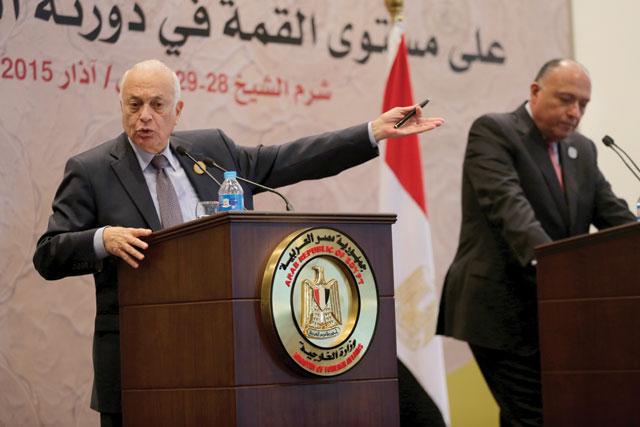You are here
‘Feasibility of planned pan-Arab force depends on details’
By Khetam Malkawi - Apr 06,2015 - Last updated at Apr 06,2015
AMMAN — Although Jordan will always be part of any effort to defend Arab security and stability according to a senior government official, some analysts are optimistic, while others are sceptical about the feasibility of forming a joint Arab force as proposed at the recent Arab Summit.
Arab leaders officially approved forming a joint military rapid response force by Arab countries to preserve their stability and security when the need arises.
Participation in the joint force will be optional for member states of the Arab League. The force's main task is to address threats facing any Arab state or pan-Arab security, including those posed by terrorist organisations, Arab leaders said in the Sharm El Sheikh Declaration at the end of the 26th Arab League Summit.
Mohammad Momani, the government spokesperson said it is too early to talk about Jordan’s contribution to such joint force as this is an Arab League decision, the details of which are still in the making.
But, he stressed that “Jordan will always be part of any effort to defend Arab security and stability.”
Sultan Hattab, a political analyst and a former columnist at Al Rai daily praised the creation of the force, noting that the Arab coalition against the Houthis in Yemen, led by Saudi Arabia, paves the way for such a mature experience in joint military action.
The analyst also believes that Saudi Arabia can be the best candidate to lead such a permanent force in the region.
“Saudi Arabia has the funds and is already leading the GCC troops,” Hattab told The Jordan Times.
“If the Saudi-led coalition succeedes in its mission against the Houthis, it will definitely manage to lead other missions,” the analyst said.
Curtis Ryan, a US-based political scientist and Middle East specialist was cautiously optimistic.
“A joint force has been talked about so often before, but there is a chance that this time it actually amounts to something,” Ryan told The Jordan Times.
However, the success of forming such a force, he said, depends not only on if it is used at all, but also on precisely how it is used.
“A rapid reaction force to assist countries threatened by Daesh would be one thing, but a force that turns into a Saudi-led proxy coalition for a Saudi-Iranian cold war would be very different and dangerous,” the expert explained.
He, however, noted the situation for Jordan would be particularly difficult.
“Jordan has advocated pan-Arab security cooperation and wants to support its Arab allies... but there is always the danger of getting dragged into larger conflicts. It's a difficult balance,” he concluded.
Meanwhile, other analysts were less optimistic.
“We do not want to lose hope, but such power will not work out,” said military and strategic expert retired major general Mamoun Abu Nowar, adding that Arab countries have different perspectives, in accordance with the “hot spots of their interests”.
Citing the GCC shield force as an example, Abu Nowar said this power was dissolved more than once.
In addition, the military expert noted that Arab countries lack command and control and it is not clear who will lead such a planned joint force, regardless of Saudi leadership in the ongoing Operation Strom of Resolve.
This was also echoed by political analyst Oraib Rentawi.
According to Rentawi, there are several obstacles that will not lead to a successful joint coalition of Arab countries.
He agreed on one of them with Abu Nowar, noting that different countries have different interests in any war or security missions they are involved in.
For Jordan and Egypt, he said, the war against terrorism is the priority, but for Saudis, preventing Iran from expansion in the region is the top goal.
Thus, he noted, Saudi Arabia is leading almost 98 per cent of the strikes against the Houthis in Yemen that are believed to be affiliated with Iran.
He added that the idea of the coalition is not clear, pending the disclosure of details about its location and operation mechanisms.
This is an actual issue according to Abu Nowar, who noted that if the joint Arab forces are planned to be like NATO, this needs a budget and headquarters, in addition to joint training for troops.
Related Articles
AMMAN — Arab army chiefs on Saturday set June 29 as the deadline to complete the mission of forming a joint Arab force and presenting the re
AMMAN — His Majesty King Abdullah on Tuesday received an invitation from Saudi King Salman Bin Abdulaziz to participate in the Arab summit s
Arab leaders officially approved forming a joint military rapid response force by Arab countries to preserve their stability and security when the need arises.

















